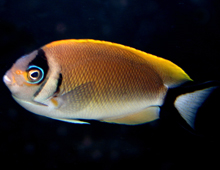Description: This species is sexually dimorphic (males and females have different colors). Female
Japanese swallowtail angelfish have a white and yellowish-dusky brown upper body, with lower body becoming white. A vertical white stripe is in front of the pectoral fins. Black markings are found behind and above the eyes, with a black area on the front of the gill cover. The base of the caudal fin and caudal lobes are black. Males of this species have a white belly, with a brilliant yellowish-orange mask that tapers horizontally down the body, dividing the striped upper back from the non-striped lower front Light orange spots can be seen on the caudal and dorsal fins. Considered by many to be the most colorful member of the Genicanthus genus.
Size: They reach a maximum length of 8.7 inches (22 cm).
Behavior: The Genicanthus semifasciatus is a protogynous hermaphrodite (born female and at some point in its life, changes sex to male). Permanent harem groups are formed, composed of a single male and several smaller females.
Diet: They are planktivores, primarily feeding on zooplankton and occasionally nibbling on algae.
Reproduction: The male ‘performs’ to get the attention of the females. He rolls onto his side or back in front of the females; or positions himself directly in front of them and quivers his caudal fin. He then positions himself alongside the female and she extends all of her fins. After a few seconds of the male nuzzling his head near the rear of the female, the pair separates, roll onto their sides and release their eggs and sperm into the water where external fertilization occurs. The eggs and larvae are pelagic.
Habitat/range: Inhabits seaward rocky and coral reefs in Western Pacific: southern Japan to Taiwan and northern Philippines.
Status: Listed as Least Concern (LC) on the IUCN Red List.



